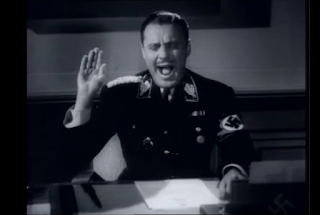GUESS...
a) Who was this man?
b) What king is he talking about? did the king survive?
c) What treasons is this man talking about?
c) Where is the king?
d) Was there another chamber of representations?
e) What was the Magna Carta? When was it signed?
f) Why was England an exception during the Ancien Régime?
d) Was there another chamber of representations?
e) What was the Magna Carta? When was it signed?
f) Why was England an exception during the Ancien Régime?


Hi there everybody! Here are my answers:
ReplyDeletea) This man was Oliver Cromwell, supporter of Parliament power.
b) The king he's talking about is Charles I, king of England from the House of Stuart. He was executed in 1649.
c) The treasons Cromwell talks about are the absolute monarchy imposing, tearing the English Parliament appart from power.
d) In the video, the king is in one of the chambers of English Parliament. I think it is the House of Commons, as they wear expensive clothes but they don't seem to be nobles or clergies.
e) There was another House of Representatives. It was called "House of Lords".
f) The Carta Magna was a legal document in which peace was established between John I of England and rebel barons. It was signed in 1215 and it became very popular during the British Revolution as a tool to fight against absolutism, especially against unfair arrests.
g) England was different from the rest of countries during the Ancien Régime because since Medieval times, the king's power was limited by the English Parliament, so absolute monarchy was imposible.
Really perfect!
Deletea) Is Oliver Cromwell
ReplyDeleteb) Carlos I. Yes, they decapitate him
c) His betrayal is being dishonest, he treasured and his secret treaties
c) Its coming.
d) Yes, there were two.
e) It was written to make peace between Carlos I and a group of rebellious barons. It was signed on June 15, 1215
f) For its revolutions.
You should improve it a little!
DeleteÁlvaro Coronado 4ºA
ReplyDeleteA)This man was Oliver Cromwell.
B)He is talking about Charles I of England and Scotland and he don’t survive.
C)He is talking about the treasons of Charles I of England.
C2)Is coming.
D)Yes, there are two.
E)Is a charter of rights agreed to by King John of England at Runnymede, near Windsor, on 15 June 1215.
F)Because the revolutions.
The name of the two chambers??
DeleteThe f) is wrong. And the g) is missing.
a) Juan Sin Tierra b) c) d) In a parlament e)yes f) It is a letter agreed by Juan I of England , June 15, 1215, firts written ny de arzobispo of Canterbury to make peace between the English King with wide unpopularity and a group of revolt barons before the illegal imprisonment , the aceess to inmediate justice and the limitations to the feudal tariffs to the Crown that would be implemented through a concil of 25 barons. g) It is not apicable since the 16th and 17th century are in the new economic regine, socially and politically.
ReplyDeleteThe questions about the Magna Carta are ok. The rest, wrong!
DeleteWho was this man?
ReplyDeleteHe was Oliver Cromwell, an English military and political leader and he exercised an absolute power as lord protector of England.
What king is he talking about? did the king survive?
Carlos I .He didn´t survive, Cromwell made judge and execute the sovereign one
What treasons is this man talking about?
Carlos I conquered in the battlefield, was not meeting defeated. Until 1647 it tried to divide to the parliamentary and at the time forces, of an unexpected way, avoided with the intention returning to ignite the flame of the civil war. Cromwell's response was fulminating. In 1648 it defeated to the Scots in Preston, which convinced them to leave Carlos I his luck and to deliver it to the members of parliament. For Cromwell, Carlos I already was not a monarch but a traitor to the mother land
Where is the king?
King Charles I entered the House of Commons
e) Was there another chamber of representations?
f) What was the Magna Carta? When was it signed?
It is a letter agreed upon by Juan I of England at Runnymede, near Windsor, on June 15, 1215. The foundation of the freedoms and the exercise of the duties and rights of the citizens, and in which, they all, including the authorities and leaders, were submitted to the laws and procedure, and obliged to respect her.
A) Oliver Cromwell
ReplyDeleteB) Carlos I. No, he didn't
C) The king didn't want to England became a constitutional monarchy, he wants to keep all the power.
C)In the gates of the House of commons waiting for entering with 100 men.
D)Yes, the House of Lords.
E) is a charter of rights agreed to by King John of England on 15 June 1215. to make peace between the unpopular King and a group of rebel barons. it promised the protection of church rights, protection for the barons from illegal imprisonment, access to swift justice, and limitations on feudal payments to the Crown,
F) Because in other monarchys the King had all the power, and in England the Parliament could limited his power and avoid an absolutits regime.